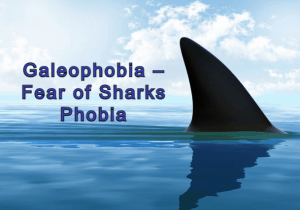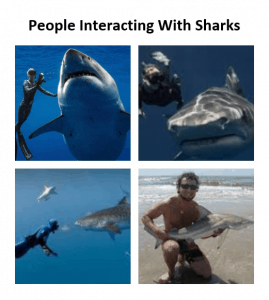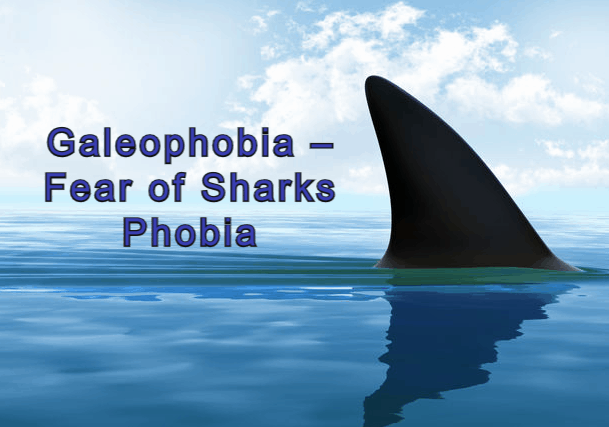Share This Article
Galeophobia: The Excessive Fear of Sharks Phobia
Do you dread watching shark films? Does a documentary about sharks send a cold shiver down your spine?
Are you afraid of swimming in the open water? Are you constantly bothered by thoughts of an ominous fin coming your way?
If the mere mention of a shark sends you into panic mode, you may have a phobia of sharks. This goes beyond the mild worry that almost everyone else has about sharks or shark attacks. Your fear of sharks and deep water may have some basis in fact, but it borders on the irrational.
Fortunately, it’s possible to overcome this illogical fear.

What Is Galeophobia?
Galeophobia or selachophobia is the name given to the fear of sharks. Galeophobia is derived from two Greek terms: galeos meaning “shark,” and phobos meaning “fear.”
Most of us would not want to encounter a great white shark while enjoying time on the beach. This apprehension is perfectly normal. What distinguishes a healthy fear from a phobia is when it keeps you from doing daily tasks.
Those with galeophobia are terrified of oceans and large bodies of water. They can’t even go near aquariums even though they know the fish are safely behind glass.
Why Are Sharks So Fearsome?
Each year, there are about 100 recorded cases of shark bites around the world. Most of these bites are not fatal. In the United States, there are an average of 16 recorded cases of shark bites annually. On average, only one fatal attack is recorded every two years.
Known for their curious nature, sharks usually bite humans because of mistaken identity. Sharks are out there preying on fish, not humans. Instead, seals and other marine life are their usual food. Your risk is low for becoming the next shark meal.
On the contrary, humans pose a greater threat to sharks. About 20 to 100 million sharks die each year through illegal fishing. This has greatly affected the shark population.
According to National Geographic, there are over 375 species of sharks. Only about 12 species are considered dangerous.
Unfortunately, the fear of sharks is primarily perpetrated and kindled by the media. The most well-known is the film Jaws, which was inspired by a great white shark.
Why Do I Have a Phobia of Sharks?
Do you wonder why you’re afraid of sharks? To begin to overcome galeophobia, you need to know what triggered it in the first place. Your shark phobia doesn’t come from what you know, but rather, what you’ve heard. It can be terrifying to think that a deadly creature with dagger-like teeth can bite you in half. However, the odds of a shark attacking you are extremely low.
The media may have played a primary role in your shark anxiety. There are so many negative media reports on sharks killing swimmers and surfers. Sharks are clickbait, so they are often portrayed as enormous, scary monsters out to kill.
For some, the fear of sharks can come from a negative experience with a shark. This traumatic experience could be direct or indirect. Maybe you saw a person get attacked by a shark or heard of such an incident from a friend or relative. Such incidents could contribute to development of a fear of sharks.
Symptoms of Galeophobia
The symptoms of a fear of sharks can be physical, mental, or emotional. Physical signs tend to be more obvious while mental and emotional signs may not be visible.
Physical Symptoms
- Elevated heart rate
- Closing your eyes when an image of a shark appears on TV
- Sweating profusely
- Shaking and trembling
- Nausea
- Dizziness and fainting
Mental/Emotional Symptoms
- Uncontrolled anxiety when you think about sharks
- Avoiding going to beaches and places where sharks can be found
- Panic attacks when exposed to shark scenes on the TV
- Persistent anxiety lasting more than six months
Now that you’ve established symptoms, the next step is to explore treatment options for your anxiety. With the proper treatment, you can get your fear under control.
Self-Help Techniques to Cope with the Fear of Sharks
Shark phobia is treatable. It starts with accepting that you have an irrational fear of sharks. Once you’ve done that, you can begin to consider treatment options. There are several methods you can explore on your own. Perhaps try one or more of those before reaching out to a professional. Read on for a few possible options.
Learn about Sharks
Conduct research and gather factual information about sharks. To dissolve the myths surrounding sharks, you must unlearn the negative knowledge you have acquired over time. Get authentic facts on shark species, diet, and habits.
Visit Sharks
To begin with, watch a documentary about sharks that portrays them in a good way. Visit a local shark aquarium and study the sharks’ movements. If this is too much for you, try getting close to sharks through images first.
After you get accustomed to sharks behind glass, try swimming with them. Swimming with sharks is done in many aquariums in a safe environment through various programs. This is an opportunity to realize that sharks are not interested in feasting on you.
Resist Shark-Attack Propaganda
Whenever an encounter of a shark and a human occurs, the media jumps on the opportunity. The media loves to call these encounters “shark attacks.” No wonder, as this headline is guaranteed to garner clicks and shares online.
It’s important to recognize that this portrayal of sharks is not accurate. Sharks are not bloodthirsty creatures out to wreak havoc on the human population.

Seeking Professional Help
If the self-help tips don’t work, it’s time to consult the experts. Consider exploring the following options:
Talk with a Shark Expert
Try talking with a shark expert. They are in an excellent position to provide information no one else can. A shark expert will present you with the facts. If they have studied sharks, they’ve interacted closely with them. Let them share with you their personal experiences.
Seek Therapy
You can opt for therapies such as cognitive behavioral therapy (CBT). This type of therapy involves identifying why the sharks cause such fear in your mind. Your therapist will work to understand your phobia of sharks and deep water. He or she will suggest ways for you to cope effectively with phobia symptoms.
How to Cope with Galeophobia
Some sharks are enormous, but that doesn’t make them killers. As a matter of fact, you’re more likely to die of a dog bite than from a shark attack. But knowing this fact is still a long way from eliminating this phobia.
Maybe it’s time you start seeing sharks in a new light. You don’t have to let a shark phobia interfere with your life. Confronting your fear is the sure way to start the recovery process.
Gather all the information you can about sharks and allow yourself to unlearn the myths.
Keep in mind that any attempt to treat a phobia requires time. Be patient. Soon you’ll be able to keep your eyes open while watching the latest shark movie with friends and family.



